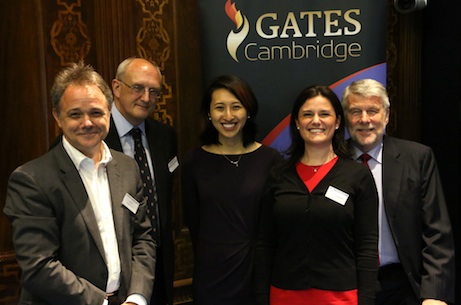
One of the greatest challenges facing the world in the next decade will be developing critical, inspiring leaders of global organisations, Jeremy Farrar, Head of the Wellcome Trust, told a debate on global health challenges last night.
One of the greatest challenges facing the world in the next decade will be developing critical, inspiring leaders of global organisations, Jeremy Farrar, Head of the Wellcome Trust, told a debate on global health challenges last night.
Farrar was speaking at the Global health in an era of austerity, conflict and climate change: defining achievable goals debate organised by Gates Cambridge and the Bill & Melinda Gates Foundation at the Royal Society.
He also stated that international connectivity meant we are all now interconnected which means “everything matters to all of us” and health challenges in one country can no longer be dismissed by the rest of the world.
He was optimistic about the political will for change and the funding opportunities from organisations like the Bill & Melinda Gates Foundation and he added that the younger generation in particular showed a “real will to make a difference” despite the huge challenges ahead.
Andrew Robertson [2001], a Gates Cambridge Scholar and Trustee who is Director of Global Regulatory Policy at Merck & Co, talked about the role of big pharma in providing solutions to healthcare challenges. He said he was relatively optimistic about the role of the private sector in global health and access issues, but added that they needed to work in partnership with other organisations.
Gates Cambridge Scholar Julia Fan Li [2008] spoke about her role as director of a new model for funding drug innovation for diseases affecting low income countries, the $108m Global Health Investment Fund. The fund aims to reconcile innovation and access issues by funding eight to 10 global health innovations over the next decade. Because any losses are protected by the Bill & Melinda Gates Foundation it is an attractive prospect for investors, she said, adding that the approach focused on investment rather than charity and philanthropy. “It provides a pool of capital that can be used for good,” said Fan Li. “And the long term social benefits will ensure investors get returns over time.”
Professor Sir Leszek Borysiewicz, Vice-Chancellor of the University of Cambridge and former head of Medical Research Council, said global health could not be seen in isolation to other issues such as education. He added that the nature of disease was changing with non-communicable disease such as heart disease and mental ill health having a major impact in developing countries and that many of the issues facing the world, like food shortage, required urgent solutions.
He said improvements needed to be made to the system of delivering healthcare and universities like the University of Cambridge had a big role to play in this. “We have the capacity to influence outcomes. We need to work together and share our knowledge with partners in other countries,” he said.
The audience of 100, which included Gates Cambridge Scholars and guests from the media, government, NGOs, and academia, questioned the panel about issues ranging from whether it was more important to strive for academic success or try to have more immediate impact on the ground and how to speed up the regulatory system for healthcare innovations without, in Farrar’s words “creating poor products for poor people”, to sustainable development goals.
The event was moderated by Dr Tine Van Bortel, Senior Research Associate in Public Health at the Cambridge Institute of Public Health, University of Cambridge.
Photo:Kip Loades












